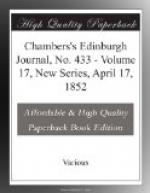According to traditional usage, the monarch must perform a pilgrimage to the tombs of his ancestors. The astronomical, or rather astrological board having ascertained the month, the day, the hour, even the minute, when the stars would prove propitious, the cavalcade set out. The princes of the blood, the ladies of the palace, and the favourite ministers of the court, formed part of the train, which was attended by at least 2000 camels. But even an emperor cannot travel through waste and desert lands without inconvenience; and though great preparations had been made beforehand in erecting temporary dwellings where no villages were to be found, yet his Celestial majesty, with his court, had often to bivouac under tents in the open air. The people crowded in thousands to see their sovereign—a liberty which, it is well known, may not be used in Peking, where every one must hasten to hide his head as from the fabled Gorgon. The ancestral tombs at Mookden, where the imperial manes repose under care of a large garrison, were at length reached. And now Taou-Kwang became a family man, abandoning the forms of state and the pomp of empire, and mingling in familiar intercourse with his relatives and attendants. Such particulars prove that we must receive at very considerable discount the descriptions hitherto published concerning the extreme sacredness of the emperor’s person, the monotonous routine of ceremony to which he is condemned, and the impossibility of his ’indulging in the least relaxation from the fatiguing support of his dignity.’ Turn we now to public events.
By a series of unexpected conquests, the three largest empires in the world have been gradually approaching each other’s frontiers in Asia. England, from the distant West, has formed military establishments bordering on Thibet; China, from the remote East, has come to take that country under its dominion; while Russia, the colossus of Europe, has traversed the ice-fields of Siberia, and furnished an extensive northern frontier to Mongolia and Manchooria, the Tatar dominions of China. These powers, by their combined influence, keep within bounds the lawless hordes of Asia, by whose frequent irruptions in past ages vast regions of more civilised territory were overwhelmed, and whole nations extirpated. The empire that effects most in this way is China, and that with the smallest amount of means. Its frontier army is indeed but a burlesque compared with the well-appointed warriors of England and Russia; yet the Usbecks, Calmuks, and Kinghis are kept in subjection. The volume before us gives some insight into the mode in which this is accomplished.




